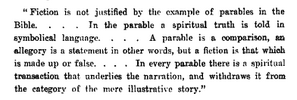VerticalLiftEnjoyer
Puritan Board Freshman
I was reading an article about the imagination today, and a scruple I’ve been having for several months now reappeared: is it presumption to write God’s actions in fiction? Or idolatry?
He has no say in what we write with His name save for His prescribed will, and if we’re essentially creating a fictional “God” with each story; planning what He shall do, whom He shall elect (if any salvation be seen) and what He shall will to pass. There was a thread on this in the ancient days, and it touched upon the subject exactly. I’ll be ignoring Dabney’s points, as he’s merely saying that fiction is infectious and unprofitable (something debatable in my eyes), but the Free Presbyterian article speaks on this directly.
The point was only touched on once in the thread, and not to my satisfaction.
He has no say in what we write with His name save for His prescribed will, and if we’re essentially creating a fictional “God” with each story; planning what He shall do, whom He shall elect (if any salvation be seen) and what He shall will to pass. There was a thread on this in the ancient days, and it touched upon the subject exactly. I’ll be ignoring Dabney’s points, as he’s merely saying that fiction is infectious and unprofitable (something debatable in my eyes), but the Free Presbyterian article speaks on this directly.
The point was only touched on once in the thread, and not to my satisfaction.

